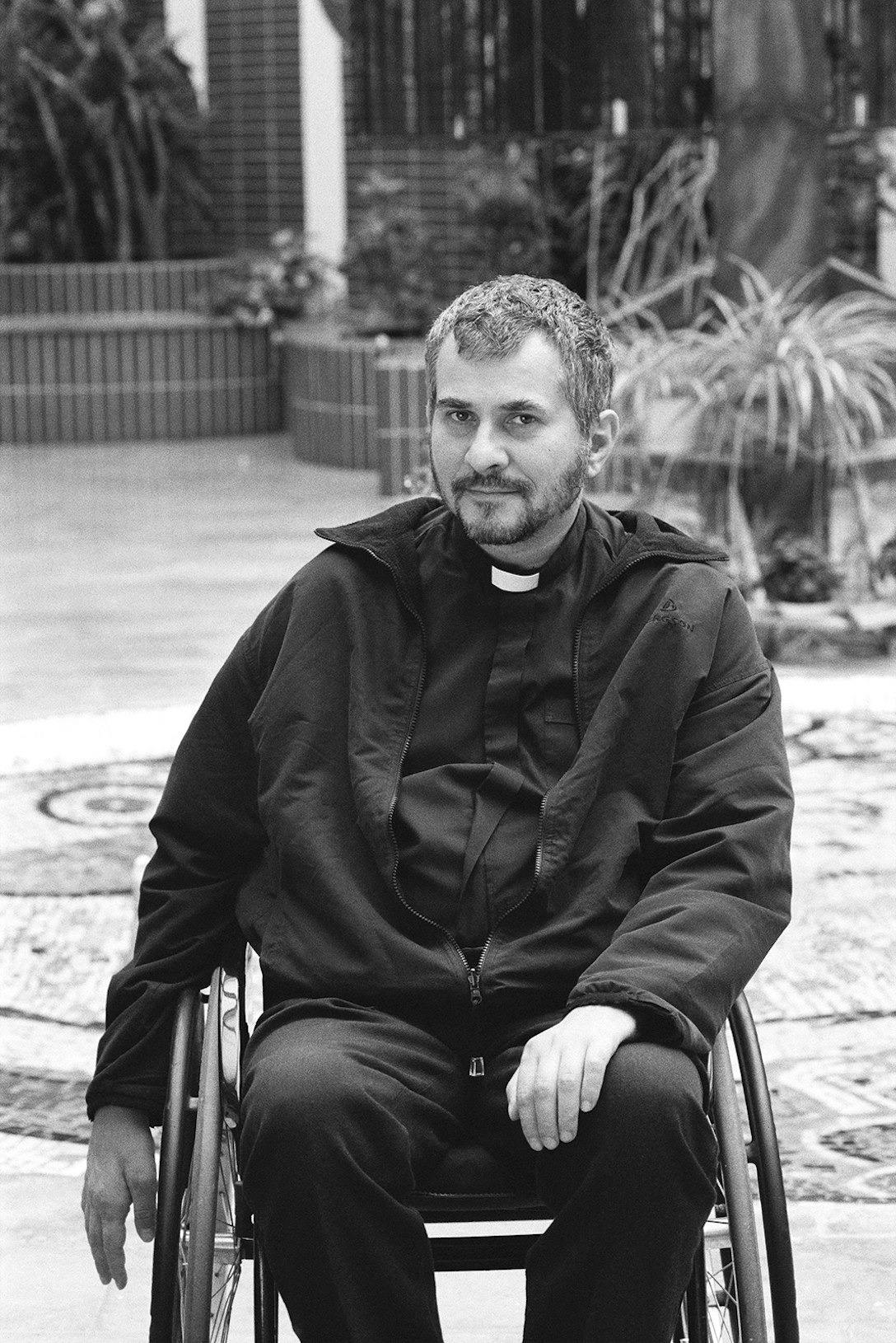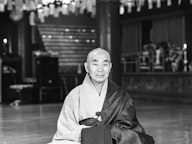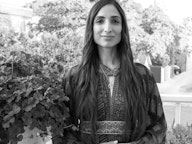
Father Andrzej Bafeltowski
Konstancin-Jeziorna, Poland
Priesthood From A Wheelchair
On my way to become the parish priest in the south of Ukraine, the Podolia region, I was driving in a car with two young Ukrainians. I felt tired so we changed drivers and I moved to the back seat. It was in the autumn, a time when tractors left mud from the fields on the road, and the car skidded. I did not remember anything else until I woke up in a hospital.
While in the hospital I did not feel any pain. At some point, I remembered I had money in my pocket and I wanted to get up and check but I couldn’t move my hand. It was a very hard experience and I asked, “God, why is it like this?” It was difficult.
At the beginning, I was unable to accept it, but I had hope that, despite everything, God would not abandon me. I thought I would stay in the hospital for one or two months and I would walk again, yet I knew that this was my experience—that of suffering. Before the accident I was a tough guy; very fit, and all of a sudden I had to rely on others.
Slowly, God became part of this experience—and it was needed—my descent into humility. Praying helped me; reciting the Psalms. I was unable to read, to keep a book in my hands. Students from the seminary and clergymen visited me in the hospital. Young seminarians were praying with me. The other passengers in the car with me, the ones from Ukraine, in the meanwhile entered the seminary. They were giving me hope. They said that I could be their confessor, even as I was lying in bed.
When I recovered, I returned to the seminary and I was a confessor for two years. At that time, I was learning to use the wheelchair.
For sure, that kind of experience was the touch of God. The accident was for me a sign that God existed and that He was guiding me. Until then I was always the guy at the peak, at the top, a very proud person, egocentric. Perhaps it was what I needed—to be able to notice the needs of other people, the sick ones who were in the hospital with me, the handicapped.
Daniel’s Reflection
I met Father Andrzej Bafeltowski in Konstancin-Jezirorna, Poland, a town located an hour’s drive south of Warsaw. My producer told me that Andrzej was a very special priest who’d been confined to a wheelchair after an accident. When we were greeted by this very welcoming and upbeat man, his demeanor surprised me as he shared the story of how he came to lose control of his legs.
His disability occurred when he was an adult, two years after his ordination. Almost his entire ministry has therefore been done from a wheelchair. He told me about his life before the accident, but I was moved more deeply by the story of what Father Andrzej did with his life and his ministry afterwards. He found ways to be useful to God despite his condition and limitations. He became a confessor (one who receives confessions) for other priests at a monastery even while lying flat on his bed. And he found spiritual meaning in his disability even though it severely limited his options for serving as a priest.
My interview with Father Andrzej reminded me of the urgent guidance I received as an over-controlling, young brand manager at Procter & Gamble. That guidance was prescient because it was exactly what I heard and learned again many years later when I embarked on this spiritual journey: “Be humble and helpful.”
Father Andrzej took an unfortunate situation and found a way to become humble and helpful. He described himself before the accident as “...always the guy at the peak, at the top, a very proud person, egocentric,” and that maybe he would have only gained humility through an event like the car accident and its consequences.
That caused me to question how to view through a spiritual lens the fact of having had an accident and suffering with disability. I reviewed traditional religious literature indicating that disabilities were karmic—punishment—for sins in a previous life or committed by one’s ancestors. I could not sign up for that understanding.
The complete opposite view is to see accidents and disabilities as purely probabilistic—the luck of the draw—without any spiritual meaning. It was no surprise that I found myself moving to the middle path, understanding that God (as I understand it), the Sacred Presence, does not cause individual accidents to happen. Rather, accidents just happen in this natural world order that God has created.
The important point is that Father Andrzej, like all of us, chose to make spiritual meaning out of the situation; to dig deep and become even more humble and helpful despite the ensuing disability.
Father Andrzej inspired me to explore how people with disabilities think about being part of a larger society that does not have these disabilities. Two major themes emerged.
First, it is the obligation of those who do not have disabilities to make the paths for those with disabilities much easier for them. I love this quote from the Torah, Leviticus 19:14: “You shall not insult the deaf or place a stumbling block before the blind.” The Torah, however, also uses disability to signal a spiritual outage such as the lisp Moses had that made him unable to speak clearly, or Jacob’s limp after wrestling with an angel. I realized that I have to overcome my cultural programming in order to see disabled persons as fully functioning members of society and to literally clear the path for them. As Julia Watts Belser so beautifully put it in her book, Loving Our Own Bones: Disability Wisdom and the Spiritual Subversiveness of Knowing Ourselves Whole, the issue is not the person’s disability as much as it is the “exclusion, objectification, pity, and disdain” by society.1
Second, I realized that, in the words of Rabbi Julie Pelc Adler, most of us will face a disability eventually so we are all really “temporarily able-bodied.”2 Many of us who consider ourselves not disabled are burdened with addictions, mental health problems, illnesses, or other issues. So, I must think of myself not as any more different or lucky or blessed than the person with visible disabilities.
I am so very grateful to have been taught these lessons by Father Andrzej Bafeltowski. He welcomed me so warmly and reminded me that all of creation is on a journey together, even those whom society or I have labeled as disabled.
References
Explore the portraits by theme
- happiness
- grief
- addiction
- sexuality
- sobriety
- transgender
- alcoholism
- suicide
- homelessness
- death
- aggression
- cancer
- health
- discipline
- abortion
- homosexuality
- recovery
- connection
- enlightenment
- indigenous
- depression
- meditation
- therapy
- anger
- forgiveness
- Doubt
- interfaith
- worship
- salvation
- healing
- luminaries

